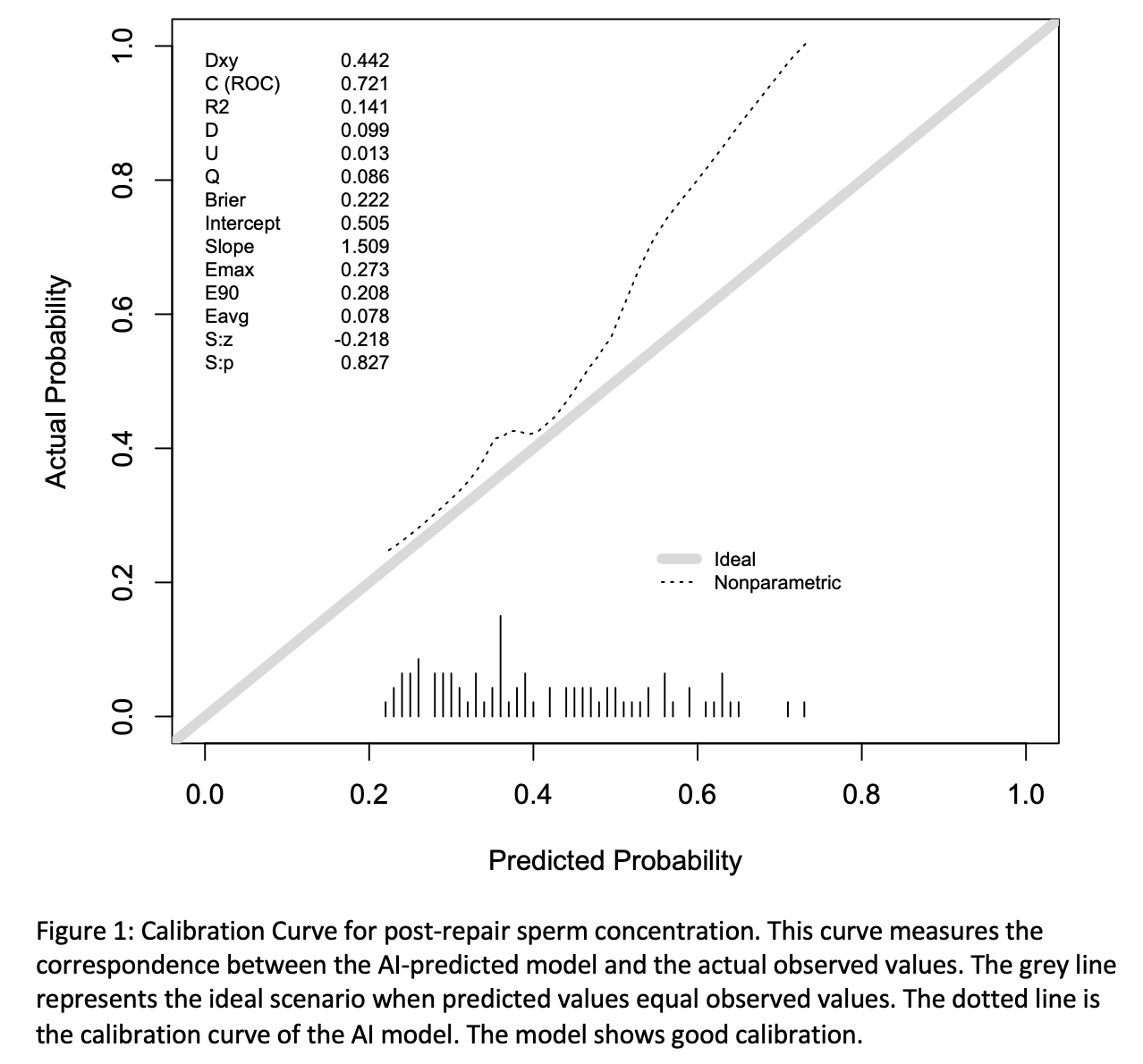Back
Poster, Podium & Video Sessions
Moderated Poster
MP34: Infertility: Therapy
MP34-16: Artificial Intelligence Based Machine Learning Models Predict Sperm Parameter Upgrading After Microsurgical Varicocele Repair: A Multi-Institutional Analysis
Saturday, May 14, 2022
4:30 PM – 5:45 PM
Location: Room 225
Jesse Ory*, Halifax, Canada, Michael B Tradewell, Miami, FL, Udi Blankstein, Hamilton, Canada, Thiago Lima, Sirpi Nackeeran, Daniel C Gonzales, Elie Nwefo, Vinayak Madhusoodanan*, Miami, FL, Susan Lau, Keith Jarvi, Toronto, Canada, Ranjith Ramasamy, Miami, FL

Vinayak Madhusoodanan, MD,MBA
Resident Physician
Desai Sethi Urology Institute, University of Miami Miller School of Medicine
Poster Presenter(s)
Introduction: Varicocele repair is recommended in the presence of a clinical varicocele together with at least one abnormal semen parameter, and male infertility. We developed an artificial intelligence (AI) model to predict which men with varicocele will benefit from surgery.
Methods: We identified men with infertility, clinical varicocele, and at least one abnormal semen parameter from two large Urology centers in North America (Miami and Toronto) between 2006 and 2020. We collected pre and postoperative clinical and hormonal data following surgery. Clinical upgrading was defined as an increase in sperm concentration that would allow a couple to access previously unavailable reproductive options. The tiers used for upgrading were: 1-5 million/cc (ICSI/IVF), 5-15 million/cc (IUI) and >15 million/cc (natural conception). AI models were trained and tested using R to predict which patients were likely to upgrade after surgery. The model sorted men into categories that defined how likely they were to upgrade after surgery (likely, equivocal, and unlikely).
Results: Data from 240 men were included from both centers. Average age was 36 years. The majority of men had grade 2 left varicocele, and (when present) a grade 1 right varicocele. A total of 47% of men experienced an upgrade in sperm concentration following surgery, 47% did not change, and 6% downgraded.
The data from Miami were used to create a random forest model for predicting upgrade in sperm concentration. The most informative parameters were preoperative FSH, sperm concentration and surgical laterality. On external validation using Toronto data, the model accurately predicted upgrade in 87% of men deemed likely to improve, and in 49% and 36% of men who were equivocal and unlikely to improve, respectively. Overall, the model performed well on external validation with an AUC of 0.72 and good calibration (Figure 1).
Conclusions: A machine learning model performed well in predicting clinically meaningful post-varicocelectomy semen upgrade using pre-operative data. To our knowledge, this is the first prediction model to show the utility of hormonal data, as well as the first to use AI to predict clinically meaningful upgrading.
Source of Funding: n/a

Methods: We identified men with infertility, clinical varicocele, and at least one abnormal semen parameter from two large Urology centers in North America (Miami and Toronto) between 2006 and 2020. We collected pre and postoperative clinical and hormonal data following surgery. Clinical upgrading was defined as an increase in sperm concentration that would allow a couple to access previously unavailable reproductive options. The tiers used for upgrading were: 1-5 million/cc (ICSI/IVF), 5-15 million/cc (IUI) and >15 million/cc (natural conception). AI models were trained and tested using R to predict which patients were likely to upgrade after surgery. The model sorted men into categories that defined how likely they were to upgrade after surgery (likely, equivocal, and unlikely).
Results: Data from 240 men were included from both centers. Average age was 36 years. The majority of men had grade 2 left varicocele, and (when present) a grade 1 right varicocele. A total of 47% of men experienced an upgrade in sperm concentration following surgery, 47% did not change, and 6% downgraded.
The data from Miami were used to create a random forest model for predicting upgrade in sperm concentration. The most informative parameters were preoperative FSH, sperm concentration and surgical laterality. On external validation using Toronto data, the model accurately predicted upgrade in 87% of men deemed likely to improve, and in 49% and 36% of men who were equivocal and unlikely to improve, respectively. Overall, the model performed well on external validation with an AUC of 0.72 and good calibration (Figure 1).
Conclusions: A machine learning model performed well in predicting clinically meaningful post-varicocelectomy semen upgrade using pre-operative data. To our knowledge, this is the first prediction model to show the utility of hormonal data, as well as the first to use AI to predict clinically meaningful upgrading.
Source of Funding: n/a


.jpg)
.jpg)